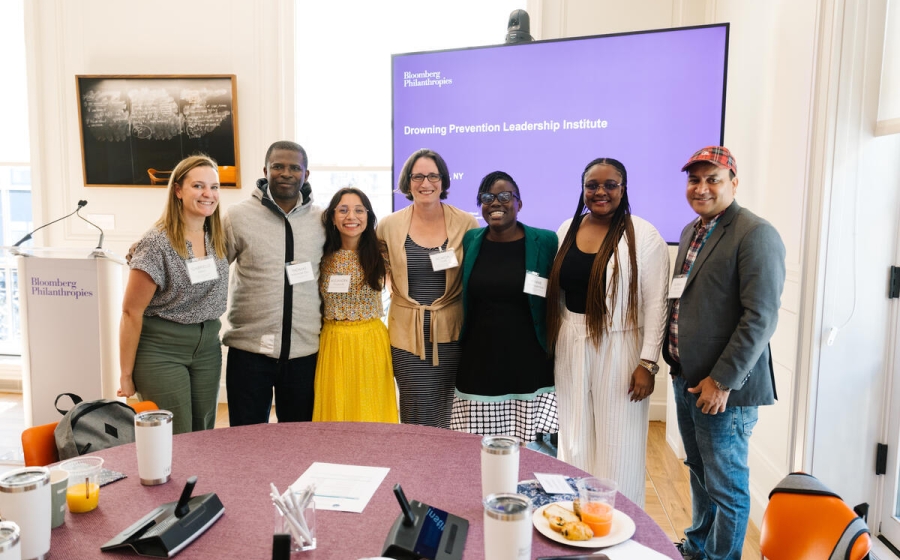JH-IIRU Empowers 32 Professionals with Tools to Advance Drowning Prevention
GDPLI 2025 participants at Sandy Point State Park, relaxing post‑field visit and post‑barbecue.
In August 2025, following the World Drowning Prevention Day on July 25, the Johns Hopkins International Injury Research Unit (JH-IIRU) proudly brought together drowning prevention professionals from around the world through the inaugural Global Drowning Prevention Leadership Institute (GDPLI).
With generous support from Bloomberg Philanthropies, the GDPLI welcomed a dynamic and diverse group of participants—professionals united by their technical expertise, intellectual curiosity, and a dedication to advancing water safety. The 2025 offering brought together 32 participants from 12 countries and professional backgrounds, who gained the skills, knowledge, and confidence needed to lead and assist drowning prevention efforts in their communities.
The two-week course featured a comprehensive curriculum, covering key topics such as:
- strategic communication principles,
- drowning prevention policy and advocacy,
- systems thinking,
- best practices and interventions to prevent drowning, and
- major risk factors including age, supervision, swimming skills, alcohol, lack of barriers, and floods.
Participants also took part in two field visits. They got an inside look at Bloomberg Philanthropies in New York and learned about community partnerships for youth swim instruction through a tour of the West Side YMCA. Then they ventured to Sandy Point State Park in Annapolis, where they discussed beach and boat safety with lifeguards and park rangers.

Participants in New York before a morning full of insightful presentations. Photo credit: Bloomberg Philanthropies
According to the World Health Organization’s (WHO) Global Status Report on Drowning Prevention 2024, an estimated 300,000 people die from drowning each year. While the global drowning death rate declined by 38% since the year 2000, progress has been uneven, with the drowning rate decreasing by only 3% in the African region over this period. The numbers reveal the critical work still ahead in protecting communities from drowning.
Dr. Richard Franklin, Professor at James Cook University, emphasized the importance of bringing drowning prevention advocates together to expand their networks, gain deeper insights into key issues, and cultivate enduring relationships that will sustain them on their path as leaders.
“As global momentum builds around drowning prevention, it is critical to have leaders who not only understand the issue but can drive change in their own countries. Through the GDPLI, participants have gained these skills, and I look forward to the impact they will make in saving lives worldwide. The GDPLI marks the beginning of a powerful journey, equipping drowning prevention advocates across the globe with the leadership skills needed to make lasting change.”
Speaking on the achievement of convening the first-ever GDPLI cohort, Dr. Abdul Bachani, Director of JH-IIRU, reflected on the importance of building global leadership for drowning prevention:
“Strengthening capacity for professionals looking to make a positive impact in people’s lives is at the heart of the GDPLI. This milestone is particularly exciting, as this first GDPLI cohort represents a new generation of leaders who are equipped not only with technical expertise but also with the vision and confidence to shape the future of drowning prevention.”
Participants from the 2025 cohort shared their reflections on how the program will shape their professional journeys and how it has strengthened their ongoing work in drowning prevention advocacy.
Linda Musiime, from Reach A Hand Uganda, emphasized how the program sharpened her skills and deepened her commitment to being a leader and advocate for drowning prevention.
“It's been very insightful, the take home on leadership and the role we have to play. I loved learning so much more about advocacy and how, as an organization, we can streamline advocacy, plan properly, and get the right people involved.”
Rizwan Khan, from Synergos, echoed the importance of strong partnerships in building momentum for his work on drowning prevention in Bangladesh.
“This training really helped me gather a lot of passion [for drowning prevention] again. Without having proper guidance, collaboration, and coordination, no initiative will sustain very long.”
To strengthen long-term connections and leadership in drowning prevention, the GDPLI team also launched the Alumni Fellowship Program. Selected alumni of the 2023-2024 Drowning Prevention Emerging Leaders Program (the predecessor program to the GDPLI) were invited to join the year-long program designed to strengthen their leadership in drowning prevention. Through personalized mentorship, project development, and strategic training, fellows implement initiatives in their countries, support GDPLI course delivery, and engage with a global network of peers.
A signature experience of the fellowship is the New York City project showcase, where fellows present their initiatives and engage in leadership sessions at Bloomberg Philanthropies. Paired with training at the Johns Hopkins Summer Institute, the fellowship provides a comprehensive experience integrating research, practical application, and leadership development.
Giang Bui, Program Manager for the Campaign for Tobacco-Free Kids and the Global Health Advocacy Incubator in Vietnam, reflected on her experience as a fellow: “For me, this fellowship has been a transformative experience. It has strengthened my leadership journey, expanded my perspective, and opened new horizons to connect with esteemed trainers and peers from around the world.”
As drowning prevention challenges continue to evolve in complexity, the GDPLI will serve as a platform for cultivating knowledgeable and effective leaders. Through a blend of hands-on training, peer exchange, and ongoing mentorship, the program supports the translation of knowledge into practical action across varied contexts. With continued investment and collaboration, the GDPLI community is well-positioned to contribute meaningfully to the global effort to reduce drowning deaths.
